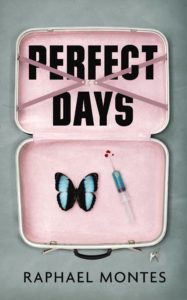Books
Dear Reader: a letter from Raphael Montes
Perfect Days is the chilling new novel by author and screenwriter Raphael Montes.
Teo, a medical student, meets Clarice at a party. Teo doesn’t really like people – they’re too messy – but he immediately realises that he and Clarice are meant to be together.
And if Clarice doesn’t accept that? Well, they just need to spend some time together, and she’ll come to realise that too. Soon, Teo has taken Clarice prisoner in the hope that she’ll settle down and be his loving wife. But the course of true love never did run smooth…
Here, Raphael introduces his new book, talks about his inspirations and explores the theme of obsessive love:
“Dear Reader,
I wrote Roulette, my first published book in Brazil, when I was at university. Roulette is about nine young people who take part in a game of Russian roulette. It’s a thriller in the form of a puzzle, full of twists, violence. When my mother read that book, she was shocked and asked me to write a love story. I took it as a challenge and tried to think what a love story would be like told my way.
Perfect Days is my first thriller to be published in English. The book tells the story of Téo, a reclusive medical student who divides his time between looking after his paraplegic mother and dissecting dead bodies in the anatomy lab. Then he meets Clarice, a free-spirited young woman who dreams of becoming a scriptwriter. Clarice is writing the screenplay for a road movie called Perfect Days. Téo becomes obsessed with her, stalks her and tries to involve himself in her life, which results in his kidnapping her in a ploy to get her to love him at any cost.
This is a classic story of obsessive love, which has already been dealt with in books such as Misery and The Collector and also in films such as Tie Me Up, Tie Me Down and Boxing Helena. As I was writing, my challenge was to find a distinct, modern approach to the subject. From the outset I was interested in exploring Téo’s mind, understanding how he thinks. After all, even if it’s a little implausible for a guy to think he can win over a woman by kidnapping her, there’s a little of Téo in all of us: he’s been rejected by the person he is in love with and, in desperation, tries to get her to give him a chance.
 I became interested in that premise because it addresses very human issues which we have all experienced in one form or another — love and rejection are universal. Who hasn’t thought that all they needed was a chance to win over someone who rejected them? This is the chance Téo tries to give himself by kidnapping Clarice. He wants her to get to know him better and for her to see how good he could be for her. I had to keep these elements in the right doses — repudiation and identification — to flesh out the plot and make readers undertake the journey without ever knowing who to side with.
I became interested in that premise because it addresses very human issues which we have all experienced in one form or another — love and rejection are universal. Who hasn’t thought that all they needed was a chance to win over someone who rejected them? This is the chance Téo tries to give himself by kidnapping Clarice. He wants her to get to know him better and for her to see how good he could be for her. I had to keep these elements in the right doses — repudiation and identification — to flesh out the plot and make readers undertake the journey without ever knowing who to side with.
Téo and Clarice are protagonists and antagonists at the same time. The upper hand passes back and forth with every page, even when it isn’t explicit (especially when it isn’t explicit). An inattentive reader might think that Téo is in control of the whole thing, but Clarice’s silent actions have an enormous effect on him. To explore these nuances, I felt that the third person was the most natural choice. The coolness and distance of the narrative were born of the character himself. At the same time, the free, indirect discourse gave me the room to explore his distorted vision. Writing from the point of view of a psychopath was especially interesting. Téo’s logic is impeccable and he justifies his behavior with a great deal of rationality and calm. I consulted a psychiatrist and three others doctors, who helped me define the character’s voice. I also read a lot about psychopaths. The hardest part was finding the right tone, really getting inside his way of thinking and teasing it out through the text.
When I finally did, months later, it all flowed naturally and, to my surprise, I was able to think like him, to accompany his disturbing behavior under a mantle of plausible justifications. Once inside his mind, it all made a lot of sense.
This psychological immersion is the driving force of the book – as well as our desire as the reader to find out if he “gets the girl” or not in the end. But this isn’t a murder mystery. The real mystery is Clarice: what she thinks, feels and wants. Neither Téo nor the reader knows – and this helps us to understand Téo’s anguish and his uncontrollable, unrequited love. Doing justice to the title, he really believes he is spending perfect days with his beloved, even though Clarice is sedated and handcuffed to the passenger seat of the car.
I believe there is a cold – perhaps even murderous – side to us all. And it is this obscure side that the story seeks to tease out. Once shown how Téo sees things, the reader identifies with — and even defends — some of the things he does. At the end of the day, he does what all of us have wanted to do at one point or another. Only most lack the courage.
Raphael Montes”


Please note: Moderation is enabled and may delay your comment being posted. There is no need to resubmit your comment. By posting a comment you are agreeing to the website Terms of Use.